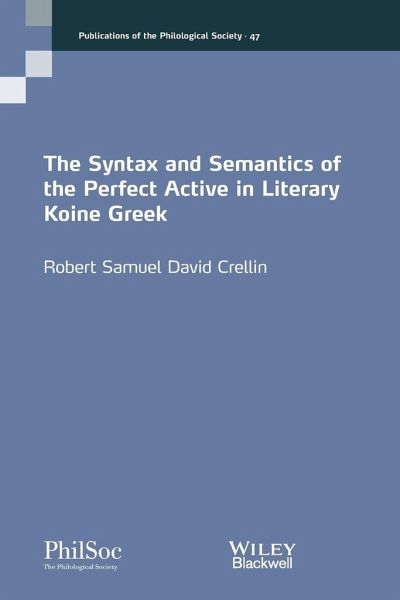
The Syntax and Semantics of the Perfect Active in Literary Koine Greek
Versandkostenfrei!
Versandfertig in über 4 Wochen
38,99 €
inkl. MwSt.

PAYBACK Punkte
19 °P sammeln!
The Syntax and Semantics of the Perfect Active in Literary Koine Greek incorporates linguistic insights from both neo-Davidsonian and Chomskyan traditions to present a unified semantic description of the perfect and pluperfect in literary Koine Greek._ Offers a comprehensive and unified account of the Greek perfect that considers its behaviour in terms of tense and aspect, as well as voice (or diathesis)_ Features insights from the neo-Davidsonian and Chomskyan semantic traditions while addressing the perfect tense in Koine Greek_ Incorporates syntactic and semantic frameworks to provide an ac...
The Syntax and Semantics of the Perfect Active in Literary Koine Greek incorporates linguistic insights from both neo-Davidsonian and Chomskyan traditions to present a unified semantic description of the perfect and pluperfect in literary Koine Greek.
_ Offers a comprehensive and unified account of the Greek perfect that considers its behaviour in terms of tense and aspect, as well as voice (or diathesis)
_ Features insights from the neo-Davidsonian and Chomskyan semantic traditions while addressing the perfect tense in Koine Greek
_ Incorporates syntactic and semantic frameworks to provide an account of the perfect in terms of the causative alternation and aspectual classes of predicate
_ Utilizes a large corpus of material that has not been previously discussed in a linguistic sense relating to the question of the semantics of the Greek perfect
_ Offers a comprehensive and unified account of the Greek perfect that considers its behaviour in terms of tense and aspect, as well as voice (or diathesis)
_ Features insights from the neo-Davidsonian and Chomskyan semantic traditions while addressing the perfect tense in Koine Greek
_ Incorporates syntactic and semantic frameworks to provide an account of the perfect in terms of the causative alternation and aspectual classes of predicate
_ Utilizes a large corpus of material that has not been previously discussed in a linguistic sense relating to the question of the semantics of the Greek perfect


